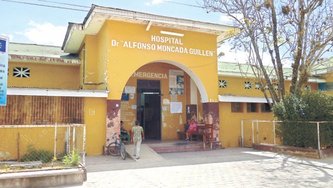 The General Hospital in Ocotal The General Hospital in Ocotal Free Healthcare I burned my leg pretty badly about two and a half weeks ago and the wound is still infected but healing, very slowly, I think. I self-treated the wound for a few days, before I decided I was out of my depth and needed some more help. A friend took me to the local hospital to see the dermatologist. An organized emergency room of sorts, run by the government to provide free health care. It's a fairly simple system to get registered and after a couple of visits to a couple of desks, I see the dermatologist. Prescriptions for antibiotics, an antibiotic injection, an astringent powder and an antibiotic cream - all to be applied twice daily. I have heard a couple of stories about the hospital, one of which is that it is not uncommon to have 2-3 people to a bed and a chronic shortage of bedsheets. The facilities are certainly basic and we had to wait for the dermatologist and a co-worker to finish their breakafst of nacatamales (a local delicacy of ground cornmeal, meats and gravy all wrapped and boiled in the leaves of a plantain) before they would see anyone, about a half hour late. There isn't much hand washing as far as I can see, but the nurse did don rubber gloves to clean my wound. Getting the medications was a lesson in itself. You don't actually need prescriptions to get drugs in Nicaragua, but it helps to make sure people get the right things, which is why I think we are given them. You can get anything you need just by asking, which must be a nightmare to those who are trying to control excess use of antibiotics. They use them here like jelly beans. I bought everything in a pharmacy, including my own syringe. With goods in hand, I walked the street in search of a nurse. The first, who also ran a corner grocery store, no longer worked as a nurse. She recommended me to a second, who also no longer worked. From her to a third, who also owned a corner store. Luck was with us, she still worked. We entered through her side door. She took my antibiotic, the syringe, asked me to drop my pants and lay across her bed. In spite of her request being in Spanish, my mind immediately went to Dylan's song, "lay-lady-lay, lay across my big brass bed." Only this was just a mattress with some pretty suspect-looking sheets in a dusty, window-less room. The nurse was lovely: sweet, kind, gentle - just not quite the facilities I am used to back in the Fenway Health Center in Boston! P.S. I have a third, follow-up appointment for 8 am next Tuesday. They have a really simple scheduling system here. Everyone's appointment is at 8 am...everyone...you just wait until the doctor is ready to see you...or has finished her nacatamale! 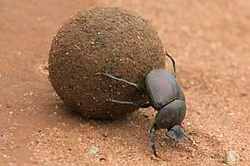 One Man's Dung Is Another Beetle's Meal When I was fourteen, or so, I spent a weekend in a theater workshop pretending to be a dung beetle. The memory is still strong but incomplete. I don't remember where I was or if our ball of dung was imaginary or made out of wire and papier-mâché. I have memories of it being much larger than I was, whether imaginary or not. And why a dung beetle? I have no idea! We actors have always been on the fringe of cutting-edge self-development and self-discovery techniques. 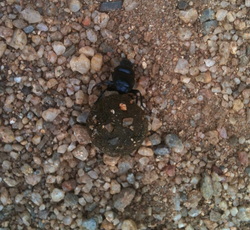 Dung beetles collect dung in balls and roll them to their nests to feed their young. They also lie on top of them when it is too hot to keep themselves cool, the dung acting like a clay container filled with water - the evaporation of moisture cools the dung and the beetle cools his belly, much like a dog on a cold, kitchen floor. What's more, dung beetles roll their balls with their hind legs, their faces to the ground, basically backwards, and apparently with amazing accuracy. You can watch a video I took of a dung beetle if you click on the picture to the right. I came across this dung beetle on the unpaved road, walking from the Institute on my way to the mainroad to catch a taxi. I had never seen one before, but I immediately recognized what it was from my weekend of being one...albeit on a different scale. And I began to think that a dung beetle is an awesome metaphor for working as a novice the world of development in the America's second poorest, developing country. You are doing a good thing (dung beetles are the ultimate recycling machine at the bottom of the food chain), most of the time you don't know where you're going and you're doing it blind-folded (at least it often feels like that to me), and yet you are bringing good things to the local people (apparently the young beetles thrive on the stuff) while working at the base of the pyramid (where few people want to spend much time - Disneyworld and Las Vegas are much more attractive options). When I put it like that, I guess one never knows where a weird, theater workshop that one takes as a teenager might actually teach you something that you end up using some 40+ years later. 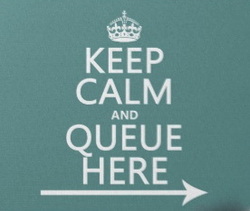 Queuing Is A Peculiarly British Thing I generally think I am pretty culturally flexible, bowing to cultural norms and bending as necessary to fit in, not rock the boat and become as inconspicioius as possible (another common British trait, desiring not to be noticed). One thing, however, I can not get used to is the complete lack of queuing here in Nicaragua, except outside banks on payday, where security guards with second-hand, Russian-looking machine guns guard the doors and frisk you with a metal detectors before letting you enter. I am quite sure they are not trained in either! There is absolutely no shame in cutting in, regardless of who is in line, or how old others are, or how infirm, or anything. People just push their way to the front as though nothing else matters in their world at that moment. It happened to me in the hospital. It happened to me in the pharmacy. Now I avoid conflict like the plague, my excuse being that I don't have the vocabulary to tackle some twerp who cuts in front of me, so I generally say nothing. The good news is, that this sad but true failing on my part (many therapists have failed to crack this one), is helped by the fact that I am about 9" taller than the average person, older and white. In other words, in a public hospital where the poorest people come for free care, I stick out like a sore thumb. Fortunately, the desk staff and the people behind the counter are better mannered, notice me in a second, and invite me to step into my rightful place. Which both feels good and bloody awful. On the one hand, I am where I should and I should be grateful that I am being taken care of. On the other, I feel like a cad and playing into expat stereotypes by taking advantage of my difference. 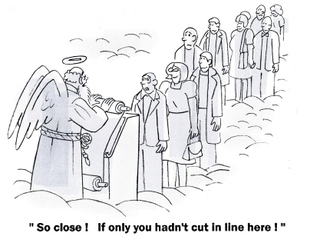 But more importantly, I wonder about the connection on the one hand between cutting in without a thought for others (i.e. a lack of courtesy in an otherwise courteous country), the sense of ownership of space and a clear sense of entitlement, with, on the other hand, the lack of resources here, the enormous and constant handouts (both from Jesus-teams, other volunteers and the government buying votes) and the total lack of care for the environment, both local and national. Very little is put in rubbish bins here. On the bus or in a car, anything and everything is tossed through the windows, nothing is recycled and aesthetics and concerns about environmental destruction are low on Maslow's hierarchy of needs in a country where many survive on less than $2 a day. And yet, I wonder if there isn't a connection here. People can be enormously courteous and gracious, and yet not. How might a little "Miss Manners" training play out in a larger context in terms of consideration of others and the impact of one person on another, both directly and indirectly. Bryant McGill wrote, somewhat darkly: “Courtesy is a silver lining around the dark clouds of civilization; it is the best part of refinement and in many ways, an art of heroic beauty in the vast gallery of man’s cruelty and baseness.” I think I prefer Ralph Waldo Emerson's words: “As we are, so we do; and as we do, so is it done to us; we are the builders of our fortunes.”
4 Comments
Irene Egan
9/19/2013 01:06:37 am
I hope you are feeling better,Richard! I so enjoyed reading about your health care. Also your book review and the impact of "home."
Reply
Richard Richards
9/22/2013 07:02:56 am
Thank you Irene. The leg is completely healed and life goes on. Thank you for reaching out!
Reply
Barri
11/29/2013 01:18:11 am
Wonderful site! I so agree with the gender issues that you raise. I am aware of a wonderful 'training' for first time fathers that helps them not be just substitute mothers. It gives them a role of their own with babies, something usually missing. Perhaps we could do something together some time. Keep up your work!!!
Reply
Richard
11/29/2013 11:18:18 am
Thank you Barri. I continue to espouse for developing an alternative masculinity and the involvement of men in gender equality training. I love your idea of a masculine child-rearing role. I was looking over a grant opportunity from UNDEF and their idea of an innovative idea for women's equality training is a program that includes men. So we are on to something!
Reply
Leave a Reply. |
BackgroundI sold house, car and most of my furniture to move to the small town of Ocotal in Las Segovias on the Honduras/ Nicaragua border. Archives
March 2014
Categories |
Contact© Copyright 2018 Richard Richards, Bournemouth, Dorset, UK
|

 RSS Feed
RSS Feed
